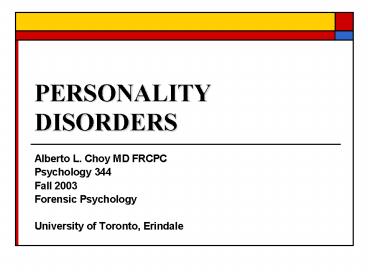PERSONALITY DISORDERS - PowerPoint PPT Presentation
1 / 24
Title:
PERSONALITY DISORDERS
Description:
Descriptions of personality disorders and application to forensic settings ... most widely used in forensic assessments. measures that address test taking attitudes ... – PowerPoint PPT presentation
Number of Views:93
Avg rating:3.0/5.0
Title: PERSONALITY DISORDERS
1
PERSONALITY DISORDERS
- Alberto L. Choy MD FRCPC
- Psychology 344
- Fall 2003
- Forensic Psychology
- University of Toronto, Erindale
2
Introduction
- Overview of the DSM-IV (credits to)
- Diagnostic and Statistical Manual of Mental
Disorders, Fourth Edition - Descriptions of personality disorders and
application to forensic settings
3
THE MULTIAXIAL ASSESSMENT
- Axis I clinical disorders - mental illnesses
and mental disorders - Axis II personality disorders and mental
retardation - psychologists can diagnose with the multiaxial
assessment
4
DIMENSIONAL MODELS
- other models to describe personality
- maladaptive variants of personality traits -
- eg five factor model
- neuroticism, introversion vs. extroversion,
closedness vs. openess (to experience),
antagonism vs. agreeableness, conscientiousness
5
PERSONALITY TESTING
- Millon Clinical Multiaxial Inventory (MCMI)
- no norms between patients and normals
- biased towards finding problems
- Minnesota Multiphasic Personality Inventory
(MMPI-2) - most widely used in forensic assessments
- measures that address test taking attitudes
6
PERSONALITY TRAITS
- an enduring pattern of perceiving, relating to,
and thinking about the world and oneself,
exhibited in a wide range of social and personal
contexts - examples impulsivity, social anxiety, affective
stability
7
PERSONALITY DISORDER (1/3)
- personality traits are maladaptive and inflexible
- and
- significant functional impairment or subjective
distress - extremes of personality characteristics
8
PERSONALITY DISORDER (2/3)
- inner experience and behaviour deviates from
cultural expectation - impairment in 2 of
- cognition
- affectivity
- interpersonal functioning
- impulse control
9
PERSONALITY DISORDER (3/3)
- inflexible and pervasive, broadly
- significant distress and/or function(s)
disturbance - stable and life-long
- NOT due to another mental disorder, substances,
medical condition - traits vs. personality disorder
10
Paranoid Personality Disorder
- pervasive distrust and suspiciousness
- sees others motives as malevolent
- criteria may include
- suspicions that they are being exploited
- unjustified doubts about loyalty of others
- closed fear of information used against
- reacts angrily to perceived attack
- suspcious / jealous of spouse
- not psychotic
11
Schizoid Personality Disorder
- detatchment from social relationships
- restricted range of expressed emotions
- prefer being alone
- criteria may include
- no interest in close relationships, including
family - little interest in sex with others
- no close confidants
- emotional flatness
12
Schizotypal Personality Disorder
- discomfort with relationships
- odd, eccentric thoughts / behaviour
- criteria may include
- ideas of reference (not delusions)
- magical beliefs (not cultural)
- suspiciousness or odd / constricted affect
- lack of close friends
- social anxiety more paranoid
13
Antisocial Personality Disorder
- disregard for, and violation of, the rights of
others - terms psychopathy, sociopathy, dyssocial
- criteria may include
- impulsive behaviours (drugs, crime)
- lacking in remorse
- deceitful / conning / manipulative
- irritable / aggressive
- evidence of Conduct Disorder (before 15)
14
Borderline Personality Disorder
- pervasive instability self image, relationships,
affect - impulsivity - criteria may include
- frantic avoidance of abandonment
- unstable, intense interpersonal relationships
- impulsive behaviour
- marked reactivity of mood / rage / emptiness
- recurrent self-harm/suicide
15
Histrionic Personality Disorder
- excessive emotionality and attention seeking
behaviour - criteria include
- flamboyant appearance / behaviour
- superficial, rapidly shifting emotions
- suggestible
- believes relationships are deeper than they
really are - seductive or provocative, socially
16
Narcissistic Personality Disorder
- grandiosity, need for admiration, lacking in
empathy - criteria may include
- solely self-involved no.1, entitled
- derogatory to others, for himself
- grandiose, self important, may exaggerate
- believes he is special / high status associates
- lacks empathy
- interpersonally exploitive
17
Avoidant Personality Disorder
- social inhibition / anxiety and feelings of
inadequacy - criteria may include
- marked social anxiety / avoids contact
- strong wish for relationships
- restraint in relationships fear of shame
- sees self as inept, unappealing, inferior
- avoids risk, especially of embarrassment
18
Dependent Personality Disorder
- excessive need to be taken care of
- submissive, clingy
- criteria may include
- fear of separation / abandonment
- will do unpleasant things to obtain nurturance
- unable to decide without excessive advice /
reassurance - will not express disagreement
- urgent relationship seeker to be taken care of
19
Obsessive-Compulsive Personality Disorder
- preoccupation with detail, order, control
- at the expense of openness, efficiency
- criteria may include
- excessive rules, details, lists, organization
- perfectionism, but too slow / stubborness
- workaholic without friends / leisure
- inflexible, scrupulous morals, ethics
- may not throw things out
- will not delegate tasks
20
Personality Disorder Not Otherwise Specified
- mixed traits
- dysfunction
21
APPLICATION
- CRIME
- CIVIL / DISABILITY
- ADAPTIVE ASPECTS
22
CRIME
- murder
- serial murder / group murder
- cults
- sex
- mutilation
- assaults
- fraud / robbery
- domestic violence
- harrassment
23
CIVIL
- disability
- malingering in disability
24
Comorbidity
- Major mental illness
- substance use / abuse
- psychopathy































